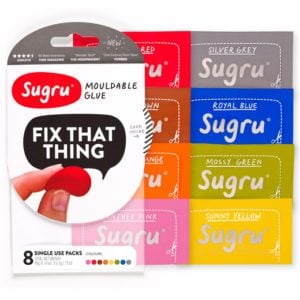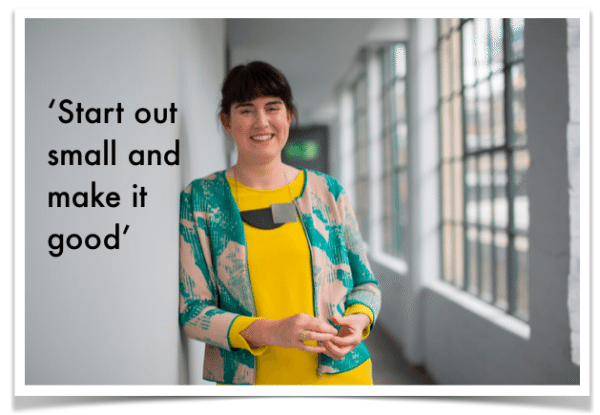“I knew it could be amazing.” Jane ní Dhulchaointigh, CEO of Sugru, one of the world’s first moldable glue brands, saw the potential in the first, we’ll say, “aromatic” blend of silicone caulk and waste wood dust she created to improve her belongings so that they worked better for her. The substance wouldn’t leave her–then a master’s student in product design at the Royal College of Art in London–alone. “I pictured it as kind of space-age rubber — super easy to shape, sticky, and durable. I knew it needed to feel gorgeous and that, if I cracked it, it’d have a million uses,” Jane wrote.
This product development story has the conclusion that many inventors fall asleep over their workbenches dreaming of: Sugru is available throughout the UK, and in the United States, recently launched with key retailers including Target and Lowe’s Home Improvement. On Crowdcube, Sugru’s crowdfunding round closed at over £3.3 million earlier this year. For perspective, since Sugru launched online back in 2010 when its first 1000 packs sold out in just six hours, the company has sold in excess of 5 million individual packs worldwide as of October 2015, with sales revenue almost doubling over the last financial year.
If you’ve used Sugru before, this might not surprise you. The glue molds like Play-Doh, sticks to almost anything–including ceramics, glass, metal, wood, and most plastics and fabric–and turns into a strong flexible rubber overnight. It’s also available in 10 colors, some of them quite vibrant. Once cured, Sugru is almost impervious to hot or cold weather and, since it’s flexible rather than rigid, can be used on things that need to be able to move like textiles, cables or shoes. Given the company’s success, some might say Sugru has sticking power.
Crowdfund Insider recently caught up with Jane for her thoughts on developing Sugru, the company’s record-breaking crowdfunding round on Crowdcube and her advice for entrepreneurs. Note: This interview has been slightly edited for clarity.
Midori Yoshimura: Before Sugru developed its own brand—and even before it was named “Sugru”—you were planning to build a partnership with a large multinational corporation. How did launching it yourselves change the direction of the company?
Jane ní Dhulchaointigh: Sugru was a bit ahead of its time, and until we launched and showed just how popular it could be, it was hard for most people to understand. Launching our own brand allowed us to do everything our own way and challenge the way useful household products have been brought to market in the past – we focused on the imagination and creativity of our customers, and getting them excited, without the initial burdens of making the product and our business fit with the constraints of mass retail distribution.
It was all about the mission, and getting ourselves and others excited about the possibilities – everyone can get hands-on and fix things, we’ve just forgotten how to do it!
Midori: After sifting through thousands of customers’ photos and stories about Sugru for your “fix of the month” pick, what have been some of your top favorites?
Jane: There are so many amazing “Fix of the Month” moments, it’s really hard to choose. If I had to push for a favorite from an extreme point of view, I’d say that Sugru being used in space is pretty amazing! A teacher and his pupils sent an aircraft up to near space, and because Sugru can withstand extreme temperatures, it was used to keep cameras in place. The whole experiment worked fantastically and the images, thanks to the help of Sugru, are incredible. My more regular favorites are stories where people who wouldn’t normally consider themselves fixers or DIYers have a go at fixing something, and feel the satisfaction of it working. Once they’ve fixed something once, there’s no going back! It can be addictive.
Midori: How do you think your record-breaking crowdfunding round on Crowdcube—which closed in July 2015 at over £3.5 million—will affect the future of Sugru? Versus if you’d pursued more traditional financing means?
Jane: Because our customers are now our shareholders too, Sugru will continue to create an even stronger sense of community. Just like Sugru, equity crowdfunding is about people power and the fact that we have that love and support globally is fantastic. These new investors become great advocates of the brand and it has been lovely to be able to draw the Sugru community closer and allow them to share in the company’s success with us too. For sure it was a testament to their loyalty and belief in Sugru that we reached our £1m target in four days.
Midori: How has a crowdfunding campaign helped to build your growing online community of users?
Jane: There are now more than a million people using Sugru in over 160 countries to fix and improve their stuff. By investing in us through crowdfunding, people are becoming personally invested and educated in both the product and the mission too – our mission is to get a whole new generation fixing and making things again and having fun at the same time, and by really engaging with this, our community are motivated to actively inspire their friends and family to have a go at fixing with Sugru too.
Midori: You first came up with the idea for Sugru in 2003, but it seems like it has been around forever. What has worked out well? What would you have done differently?
Jane: One of the best pieces of advice I ever received was something a friend said to me in the very early days: “Start out small and make it good’. Building a product I wholeheartedly believe in really helped when making decisions across all aspects of the business. With that in mind, we never looked back.
There’s not much I would have done differently as you learn as you progress and the business develops. I now know there was no point in outsourcing manufacturing which we initially tried. It was a bad idea; extremely painful quality management, with reduced flexibility. So we decided to do it our way and hired a great manufacturing manager. We are now a proud manufacturer and part of the third industrial revolution of local, lightweight, high-value manufacturing.
Midori: Last year, the Science Gallery in Dublin, Ireland, asked you to help curate a show exploring failure. The show, “FAIL BETTER,” named after Samual Beckett’s famous quote, also asked 24 leaders in their fields to nominate inspiring stories of failure. How important was failure—or willingness to risk failure—in the development of Sugru?
Jane: With an initial six-year R&D process, the business has required significant investment, both financial and looking back, my own career. It has never been a question of risk for me- I was so excited about the idea. It’s only by being constantly curious that you can figure out the barriers that exist and uncover the new opportunities, even the tough moments are worthwhile when you’re doing something that you really believe in.
Midori: Sugru is now sold in stores including Target and Lowe’s Home Improvement in the United States. Currently, the United States accounts for 50 percent of the brand’s overall sales, and is fast becoming its most profitable market. What are the key factors in the company’s American success?
Jane: Being stocked with a major retailer such as Target means we are in more than 3,500 stores nationwide, which is huge for us. Target especially opens Sugru up to a new audience, as it’s not just DIY-ers who shop there. The inaugural success of our U.S. roll out has not only proven Sugru’s worth through sales volumes, it has also helped us to establish the brand as a challenger in the adhesives market and new craft and maker movement.
I think part of our quick success in the US was due to the fact Sugru feels like it’s from the future, and it’s ahead of its time. We’re becoming more and more environmentally aware, and keen on fixing, upcycling or making rather than throwing things away. People are turning off needless consumption. There’s a feeling we’re smarter than that; and the U.S. market gets that.
Midori: Do you see yourself as a role model for female entrepreneurs?
Jane: It would be humbling to see myself as a role model for any inventor or entrepreneur.
Midori: What advice would you give to female entrepreneurs?
Jane: I wouldn’t see male or female as any different in this context, but if I were to give one piece of advice to any budding inventors or entrepreneurs out there, it would be… Make sure your idea is one that gets you really excited, and one that will make a difference in the world. The road will be full of ups and downs, and challenges you can’t even imagine when you’re starting out, and it’s this feeling for the change you want to make that will carry you through.
Midori: Based on your personal experience, do you see crowdfunding as a way in which women have more opportunities to help narrow the gender gap?
Jane: I don’t really have an educated perspective on this, because all I know is our own experience however I do know that raising crowdfunding like any investment is hugely challenging no matter who you are, and the things you need in place are a compelling market opportunity, a fantastic product or solution and most of all a talented and committed team.
Midori: What’s next for Sugru—as a company, and as a product that seems to continually be improving?
Jane: We are expanding into new markets all the time. With customers all over the world, we want to focus on building our global community this year. In terms of expanding into new markets and product development, we’re currently investing in some long-term technology projects on new forumulations of our materials, one of which is designed to open up the children’s and toy market for us. But that’s just the start. Our end goal is for Sugru to be in every home worldwide; a must-have product for the whole family, so that when you have any problem, people everywhere will say “Sugru it”!
Have a crowdfunding offering you'd like to share? Submit an offering for consideration using our Submit a Tip form and we may share it on our site!


